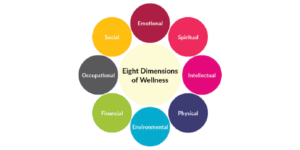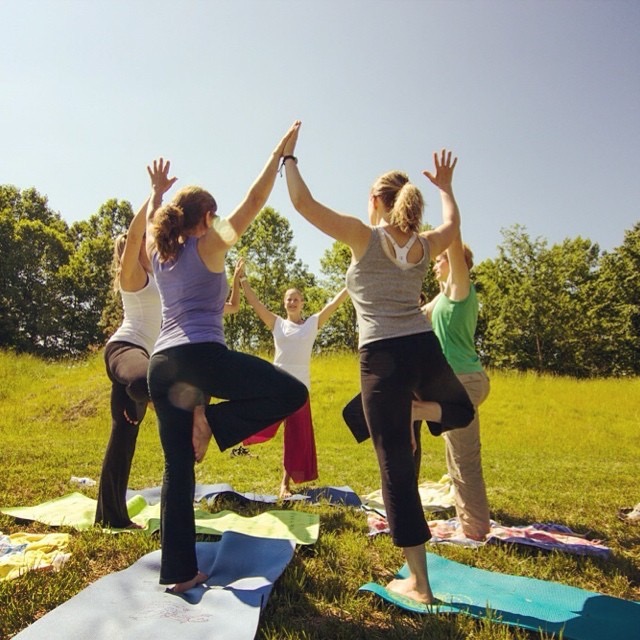The human body is so intricately designed that when one part is struggling it can affect the entire system. For example, if you’re dealing with depression, that can often lead to physical symptoms like fatigue. Or if you have anxiety, it can cause gut issues or trouble sleeping.
The mind-body connection is real, but it actually goes beyond that. Scientists and health professionals have narrowed down eight dimensions of wellness. So let’s see what they are and how to optimize them for your own health goals!

8 Dimensions of Wellness:
There are 8 dimensions of wellness that work with one another and have a direct impact on our health. When too much or too little focus is put into one dimension, there can be adverse effects on the body. In this blog, we will discuss the 8 dimensions of wellness and what you can do to improve your overall health. They include:
- Physical
- Social
- Emotional
- Spiritual
- Intellectual
- Occupational
- Financial
- Environmental
1. Physical Wellness:
Physical wellness involves having a healthy body, good health habits including nutrition, sleep, and exercise. Physical refers to taking care of your physical body. For example, What might it look like – not sitting for long periods of time and meal-prepping healthy meals and snacks. For instance, packing a lunch instead of eating out, taking a standing break every hour, or booking a yoga class.
2. Social Wellness
Social wellness refers to relationships with family, friends, coworkers, and the community. Social wellness allows us to have an interest and concern for the needs of others. However, social interactions look different for everyone, depending on if you’re an introvert or an extrovert. Someone who is an extrovert could need 8 hours of socializing a day, whereas an introvert can only handle 2 hours of socializing before exhaustion hits.
3. Emotional Wellness:
As the name suggests, emotional wellness is the ability to express feelings, adjust to emotional challenges, cope with stress and actively enjoy life. In this dimension, it is important to understand your personal strengths as well as what you can do to improve yourself with goals and the help of others. To understand your emotional wellness, here are some questions you can ask yourself:
- Have you had relationships with friends, family or significant others where you can safely express your feelings?
- Do you take responsibility for your actions?
- Have you considered writing in a journal when your feelings become too overwhelming?
- Do you have a stress-relieving activity like yoga to declutter your mind?
4. Spiritual Wellness:
Spiritual health refers to your belief system about the world or universe and your purpose. So why is it a part of our health? Simply put, if you’re in a place of mistrust or chaos about the world or your role in it, it can cause stress. This includes recognizing your sense of purpose in human existence as well as developing your appreciation for your place in the universe. The concept of spiritual wellness can be difficult to grasp and takes time to establish. When Building up your spiritual wellness, you can:
- Spend time meditating and reflecting on your spirituality
- Explore different belief systems
- Appreciate and explore nature
- Take the time to determine the values, principles and beliefs that are most important to you
- Determine a place that you can go to discuss your beliefs with others
- Reach out to others in the community when they’re in need
5. Intellectual Wellness:
The goal of this dimension is to ensure that your brain is active and constantly expanding your perspective. You maybe surprised to know that intellectualism is one of the 8 dimensions of wellness? Well, humans are curious creatures by nature. So making time for creativity and learning can be important in reducing stress, increasing cognition, and staying happy and fulfilled. In terms of wellness, this can look like reading books, learning an instrument, taking courses, having deep conversations, or getting a degree or certification. Here are some tips to improve your Intellectual Wellness:
- Try a new hobby like painting, pottery, or even martial arts. This allows you to improve your skillset.
- Expand your existing education by earning an industry certification or attending a class.
- Keep your mind sharp by playing brain games or mind teasers.
6. Occupational Wellness:
Occupational wellness, also known as Vocational wellness, involves participating in meaningful and purposeful activities such as work and education. Occupational wellness should involve personal satisfaction and enrichment from your work. For some people, amping up your occupational health may mean finding a new job you love, or for others, it means doing less work and spending more time with family. Work/life balance is key!
7. Financial Wellness:
Often tied to stress, financial wellness is an important aspect of our daily lives. There are many opinions on what is considered to be financially well, but it depends on your goals are. Financial wellness involves things like savings, debt, income as well as your individual understanding of your financial situation and goals. Financial wellness can also be tied to occupational wellness since it involves actively earning income.
8. Environment Wellness:
Environmental wellness includes access to clean air, food, and water as well as preserving the areas in which we live, learn, and work. Environmental wellness refers to the sense of safety, comfort, and connection with your physical surroundings. You can improve your environmental wellness by the following ways:
- Decorate your living spaces in a way that you enjoy
- Limit water and power when at home to cut back on energy
- Reduce, reuse and recycle whenever possible
- Spend time outside and appreciate the nature in your community
- Get rid of clutter within your home on a regular basis
Conclusion
Remember, health is always an ongoing adjustment. So don’t be afraid to revisit a certain area and re-optimize it again!,
By working toward improving all these areas with small goals, you are taking a step to improve your overall health. At Modern Psychiatry and Wellness, we understand that improving all the dimensions of wellness can be an overwhelming task.
You can also visit this site for more information


Helpful information. Fortunate me I found your site accidentally, and I’m surprised why this twist of fate did not took place earlier! I bookmarked it.
Woow That’s great idea
Have you ever considered about adding a little bit more than just your
articles? I mean, what you say is important and all.
However think of if you added some great visuals or videos to give your posts more, “pop”!
Your content is excellent but with images and clips, this blog could certainly be one of the most beneficial in its
niche. Very good blog!
My web blog – nordvpn coupons inspiresensation (t.co)
Thank you for your articles. I find them very helpful. Could you help me with something? http://www.kayswell.com
Thank you for writing this post! http://www.kayswell.com
I want to thank you for your assistance and this post. It’s been great. http://www.hairstylesvip.com